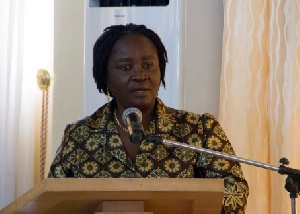Professor Naana Jane Opoku-Agyemang, Minister of Education, is leading a high powered government delegation to the World Education Forum scheduled for Incheon, Republic of Korea, slated from May 19-22.
A statement issued by the Ministry and copied to the Ghana News Agency on Thursday said, the delegation comprises of Mr Enoch H. Cobbinah, the Chief Director, Ministry of Education, Mr Jacob Kor, the Director-General of the Ghana Education Service, Mr Stephen Adu, the Deputy Director-General of the Ghana Education Service, and Prof Yaw Ankomah, the Chairman of the Education Committee of the Ghana National Commission for United Nations Education, Scientific and Cultural Organization (UNESCO).
The main objective of the 2015 World Education Forum, led by the UNESCO in collaboration with six co-conveners: United Nations Development Programme, United Nations Population Fund, United Nations High Commissioner for Refugees, United Nations Children’s Fund, UN Women and the World Bank Group.
The forum would review the performance of the Education for All (EFA) goals (2000 – 2015) set in Dakar in 2000 by the international community, and set the new global education agenda for the next fifteen (15) years (2015 – 2030).
The Six EFA goals agreed on in Dakar are expand early childhood care and education; provide free and compulsory primary education for all; promote learning and life skills for young people and adults; and to increase adult literacy by 50 per cent.
The rest are to achieve gender parity by 2005, gender equality by 2015 and to improve the quality of education.
Ghana’s delegation is taking part in discussions on the five key themes of the Conference, namely right to education, equity in education, inclusive education, quality education, and lifelong learning.
The Minister of Education in a High-level Panel discussion at the Opening Plenary on Tuesday, spoke on the theme “Rethinking Education: Towards a global common good?”
At this session, she spoke extensively on Ghana’s progress in the pursuit of the Education for All goals, particularly in the area of Early Childhood Care and Education, where UNESCO has cited Ghana as having achieved significant results, as well as improvement in access and participation across all the levels of education in the country.
She further shared Government’s forward-looking post-2015 education agenda, and elaborated on improving equitable access to and participation in Quality Education at all levels, and improving quality of Teaching and Learning, especially in Mathematics and Science.
The others are improving management of Education service delivery with focus on efficiency, and strengthening and rebranding Technical and Vocational Education and Training to make it more responsive to the World of work.
In another high-level panel discussion on Global Citizenship Education (GCED) and Education for Sustainable Development (ESD), Professor Naana Jane Opoku Agyeman, the Minister for Education touched on the theme “Educating and learning for peaceful and sustainable societies”.
At this session, Ghana’s position on Education for Sustainable Development was shared with participants at the Forum.
The Minister participated in other side events/meetings.
Ghana’s delegation would also take part in key parallel sessions’ discussions at the Conference including equity and inclusion in education; achieving gender equality in education; effective governance and accountability in education and providing meaningful learning opportunities to out-of-school children.
An International Conference on Information and Communication Technology (ICT) and Post-2015 Education will also be organized back-to-back with the World Education Forum, in Qingdao, China.
At this Conference, Ghana’s Minister for Education had been requested by UNESCO to share Government’s position on “strategies in the area of ICT and post-2015 education”, emphasizing ICT in Education Policy and Open Educational Resources (OERs).
The ICT and Education Conference (Qingdao) seeks to create an interface between education and ICT sectors to debate on how ICT can be leveraged at scale to support the achievement of post-2015 education goals and targets.
The output of the two Conferences would lead to high-level statements by governments to make commitments to implement the proposed post-2015 Education Agenda (Education 2030) within the Sustainable Development Goals.
Regional News of Friday, 22 May 2015
Source: GNA













